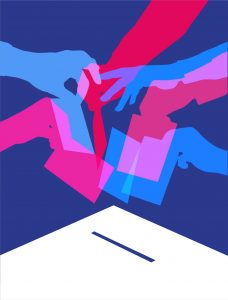 Susan McWilliams doesn’t mince words when it comes to predicting the future of the American Experiment.
Susan McWilliams doesn’t mince words when it comes to predicting the future of the American Experiment.
What’s Next For:
Revolutions?
Syria?
Mexico?
Japan?
The United States?
Earthquake Safety?
Climate Action?
California Water?
Climate Science?
Solar Energy?
California Fruit Farming?
Technology Investing?
Nanoscience?
Digital Storage?
Artificial Intelligence?
Cyber-Threats?
Social Media?
Space Exploration?
Science Museums?
The Sagehen?
Biodiversity?
The Blind?
Big Data?
Mental Illness?
Health Care Apps?
Maternity Care?
Etiquette?
Ballroom Dance?
Thrill Seekers?
Outdoor Recreation?
Funerals?
Writers?
Movies?
Manga?
Alt Rock?
Women in Mathematics?
“Republics don’t last,” says Professor of Politics McWilliams. “I don’t think we should shy away from the assumption that this republic, like all other republics has an expiration date. If we acknowledge that, then we realize that it is our job to think about how to prolong republican government as much as possible. We should be asking ourselves: What are the specific dangers to republican collapse that we’re seeing now, and how can we mitigate those?”
Those dangers, says Professor of Politics David Menefee-Libey, include the current attacks on liberal democracy and the rule of law by the president and some of the most powerful people in government. “We should also be worried about the cynical ways so many people in the business and nonprofit worlds have responded—taking advantage of the system even as they work to erode it,” says Menefee-Libey. “They spend enormous amounts of money and work so hard to gain influence at the same time they talk trash about politics and governments in public. They seem to want the U.S. system to become more of an oligarchy, run by and for the rich and powerful, than a democratic republic.”
That sounds familiar to McWilliams, who studies the history of political thought. About 2,400 years ago, she says, Plato wrote about oligarchs and their contempt for democracy and linked the uncertainty in people’s lives to democracies that devolve into tyrannies. “Think about America now,” says McWilliams. “We have a low unemployment rate, but most Americans have lives that are very uncertain, where they’re living paycheck to paycheck, where they’re not sure what their children’s lives are going to look like. Plato says if you’re feeling that kind of overwhelming uncertainty, you’re going to be inclined to follow people who tell you, ‘I am certain about this.’”
An antidote to oligarchy and tyranny, suggests McWilliams, is liberal arts education. “The liberal arts are meant to educate in the arts of liberty; that’s where the phrase ‘liberal arts’ comes from,” says McWilliams. “(W.E.B.) Du Bois would say what we’re doing in American today is moving away from a mode of education that aims at civic and political empowerment, and we at places like Pomona need to do all we can to support liberal education everywhere.”
When you educate people, adds Menefee-Libey, it challenges parochialism and the ability to think that other people are somehow less human and less worthy of respect and inclusion in public life.
“I think the next 10, 20 years are going to be extraordinarily difficult, but I also think that there are ideas and leaders, policies and strategies that can get us out of this,” says Menefee-Libey. “I am not an optimistic person, but I am a hopeful person, and I think there’s a tremendous amount of hope.”
